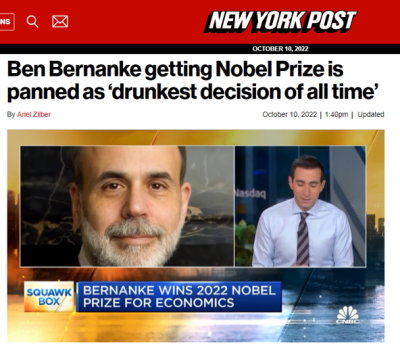If you would like to receive weekly updates like this, sign up here.
“And so, once again, thank you ladies and gentlemen for awarding me this 2022 Nobel prize for economics”.
As I step away from the lectern, I spare myself a quick moment to reflect on how I got here.
And of course, the inspiration behind this award should also not go unnoticed.
“Thank you, Mr. Ben Bernanke,” I whisper quietly to myself, “for your inspirational teachings in the field of economics.”
“If it wasn’t for you, I would never have appreciated how being too late to act, how doubling down on bad decisions made to rectify being so late in the first place, could have resulted in becoming a laureate and a Nobel Prize winner.”
Of course, by now you realize I speak in jest. I didn’t win a Nobel prize this year and I certainly won’t be receiving one soon either.
There is an element of truth to the story, though: Ben Bernanke, the former head of the US Federal Reserve did indeed win a Nobel prize for economics recently.
And in being jointly awarded ‘The Sverige’s Riksbank Prize in Economic Sciences in Memory of Alfred Nobel 2022’ alongside fellow economists Douglas Diamond and Philip Dybvig, it supported my idea that being wrong, realising too late that you’re wrong, making even worse decisions to try to sort out the mess, can land you one of economics’ most prestigious awards.
So, my dear readers, if you are going to fail, remember always to fail big! The biggest prize in economics could await you.
Let me explain to you just how he did it.
The wrongs lesson from the Global Financial Crisis.
It speaks volumes to me that this award relates to Bernankes prior research on banking crisis between the late 1980s to the early 1990s. It also indirectly calls out his actions (or in-actions) carried out on behalf of the US Federal Reserve almost 14 years ago.
Is that by design? Was it best to award this long after the event that most average folk had completely wiped it from their minds?
Indeed, such thoughts were mirrored by a Financial Times article covering the event.
“Sweden’s Riksbank is sometimes accused, only half in jest, of awarding the Nobel memorial prize for economic research decades after the research in question actually made a difference.
One could be forgiven for wishing the accusation were true today. The work that the 2022 prize honours — runs on financial institutions, the damage they do, and how to prevent them — remains depressingly timely.”
Sorry Professor Bernanke, but having your work described as “depressingly timely” ranks high in the Parthenon of back-handed compliments.
I can’t help but notice however, as the quoted article dives deeper behind the decisions he made during the dark days of the GFC, that nothing has been learnt.
14 years haven’t dampened or made less relevant the fundamental role banks play in the economy and above all the role they play when things go wrong.
Rather, the real reason, the true culprit as it were, has been completely missed.
Not a single person interviewed about this award mentions it. Not one article covering the celebrations even think to include it.
And this worries me no end, as should you, because it simply means that we are going to experience this whole mess once again.
Bernanke’s work centred on the how and why banks are vulnerable to deposit runs when the economy turns bad and establishes the central argument for government deposit insurance.
From the article (emphasis my own):
“Bernanke at around the same time analysed the devastating effect bank runs can have on economic functioning by blocking credit flows and destroying knowledge about creditworthiness.
His research on the 1930s downturn showed how bank failures helped turn a run-of-the-mill recession into the Great Depression — which had until then been explained largely as the result of bad monetary policy.”
Can you see it?
The word ‘land’: do you see it now?
Of course not!
After all these years, ninety in fact, the explanation of what fundamentally caused the Great Depression is wrong.
Bad monetary policy is a symptom not a cause. By not factoring in the crash of the land market as the key contributor to the crisis the myth continues to linger.
Even if you have only personally read a handful of Property Cycle Investor blogs thus far, you will know the importance the PSE team places on ensuring that land is front and centre when explaining the economy and its boom-bust cycles.
Fact is, prior to the 1929 stock market crash, those who studied the land market understood the land price had peaked well in advance of the stock market.
Phillip Anderson’s book “The Secret Life of Real Estate and Banking” speaks to this at great length.
That is a book you need to have on your bookshelf.
Suffice to say, for the sake of brevity, Phil explains how the lending standards of the day slowly faded as more credit was pushed into the land market.
Like a sponge that couldn’t take on more water, the warning signs that land had peaked were simply ignored.
And history repeats.
Now I’m hardly blaming Bernanke for the Great Depression, but he was head of the US Fed when we very nearly experienced another in 2008.
But, well…you be the judge of the following quotes and decide yourself.
Quoted in February 2006, a mere six months before land values peaked in the US.
“Housing markets are cooling a bit. Our expectation is that the decline in activity or the slowing in activity will be moderate, that house prices will probably continue to rise.”
Here is what he said in March 2007 as the land market already began to slide.
“..mortgages to prime borrowers and fixed-rate mortgages to all classes of borrowers continue to perform well, with low rates of delinquency.”
Translation: keep borrowing, valued mortgagees, the US Fed has your back, don’t worry.
Finally, less than a month after the Dow Jones index peaked on October 9th, 2007, he said:
“It is not the responsibility of the Federal Reserve – nor would it be appropriate – to protect lenders and investors from the consequences of their financial decisions.”
Translation: What the hell are you people doing borrowing so much money with no collateral? Are you all insane? Don’t call us, we aren’t helping you.
I think the New York Post neatly summed this up when it heard he had won the Nobel Prize, with the following headline:
 Source: NYP
Source: NYP
This is the only way you can possibly win.
I don’t want to come across as someone who relishes the chance to make personal attacks on people. That would be to miss the context behind this blog.
The most important thing to take away here is who can you trust? Who do you listen to?
I can’t think of a better platform than the Nobel prize ceremony to issue a call to action for future central bank heads and economists to do far better to understand and manage the true drivers of the economy.
To use Ben Bernanke’s experience of trying to manage the world’s biggest economy through its biggest ever boom then bust cycle and the influence his actions had on economic policymakers.
Because awards like these are seen as taking comment on Bernanke’s performance between 2007 and 2014 at the helm of the US Fed. During that time period he used the Fed as a lender of last resort using fiscal backstops to preserve the health of the banking system.
This is actually what the US Federal Reserve is designed for. Hence Bernanke simply followed the playbook.
These actions have now been fully internalised by the world’s central banks. The responses to the global Covid outbreak a recent case in point.
Central banks turned on the QE spigots to ensure the credit system had sufficient liquidity. So a flood of public money poured over locked down communities during March 2020.
Governments went in hard and big to provide stimulus designed to keep a lock-down economy afloat. Lessons directly linked to the Bernanake playbook.
No harm done you say. Aren’t we in a much better place now without such spending?
Stop me if you’ve heard this before. One of the main consequences of all that money was to push the price of land right up. So housing is even more unaffordable than ever.
And not like they needed another invitation, but a unintended consequence here is the fact the biggest banks now know the government will not let them fail.
This attitude encourages high levels of risk taking. It also encourages banks to lobby for regulations designed to prevent this from occuring to be amended or simply removed.
Nothing that Bernanke researched, nor his actions during the dark days of the GFC bust, have ever addressed these simple truths.
I think a Nobel prize for researching why the banks own the earth like this would be more worthy.
And so, we face the inevitable. And when the bust comes, remember Bernanke’s words to Americans back in 2007: I’m sorry but the central bank should not and cannot step in and help indebted borrowers.
You are left to your own devices again whilst possibly staring down financial armageddon.
Or maybe not. Maybe you decide to be proactive and rely on yourself using the knowledge of the Boom Bust Bulletin.
This is where you can learn the storied history of the 18.6-year Real Estate Cycle, why it continues to repeat to this vey day and be guided to the opportunities it creates as it turns.
Take charge of your own financial future, there has never been a better time. Don’t sit back and believe the financial media, governments or central bankers have your own best interests at heart.
As I’ve explained, they will act far too late because they “remain depressingly timely”!
Sign up now.
Best wishes,

Darren J Wilson
and your Property Sharemarket Economics Team
P.S. – If you would like to receive weekly updates like this, sign up here.
P.P.S – Find us on Twitter here and go to our Facebook page here.
This content is not personal or general advice. If you are in doubt as to how to apply or even should be applying the content in this document to your own personal situation, we recommend you seek professional financial advice. Feel free to forward this email to any other person whom you think should read it.



